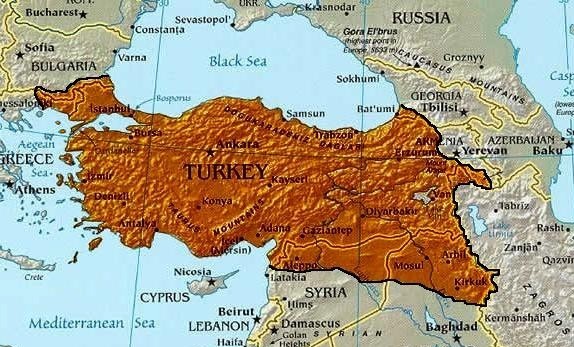Dr. Prof. M. Mkhitar Moradian, PhD, Bioanalyst
In recent years, the political landscape of Armenia has been profoundly influenced by the
shifting dynamics between Armenia’s leadership and its regional neighbors, particularly
Azerbaijan and Turkey. This influence has been shaped by the alliance between Erdogan and
Aliyev (Erdogan-Aliyev pact), which has grown stronger since the 2020 Artsakh war. While
Armenia’s Prime Minister Nikol Pashinyan and his government have failed to maintain
Armenia’s sovereignty and independence, the Erdogan-Aliyev pact has come to exert significant
influence in Armenia’s internal and external affairs. This growing influence, combined with
Armenia’s spineless regime, has led to a situation where Pashinyan’s government seems
increasingly sidelined in matters of national direction and regional stability.
Let’s review the following potential reasons:
The Strategic Alliance Between Erdogan and Aliyev
The alliance between Turkey and Azerbaijan, often referred to as the “strategic partnership,” has
grown over the past decade, particularly following the 2020 Artsakh war. In that war,
Azerbaijan, with extensive Turkish military and diplomatic support, occupied Artsakh and
ethnically cleansed the Armenian population by expelling them from their historic homeland, a
modern-day Genocide. Turkey provided Azerbaijan with military hardware, intelligence, and
direct political backing, while also intensifying its geopolitical role in the South Caucasus.
Seems like even before the war the Erdogan-Aliyev pact had started dictating their will on the
Armenian authorities. Pashinyan government’s disastrous management of the war and their ill-
advised decisions during the war could serve as the proofs that taking Armenia to a war, with
little chance of success, could have been all planned by the Erdogan-Aliyev pact and
implemented by the Pashinyan regime. Let’s point out a few of such actions taken by the
Pashinyan regime before and during the war:
Alienating Russia in various ways before the war, including disrespecting Putin himself,
so Armenia’s army won’t receive any support from their only ally, the Russians.
- Removing, firing, or incarcerating the experienced and long-time leaders/Generals of the
Armenian Army and replacing them with officers who would follow his directions
instead of what they learned in the military trainings and from the previous wars. - Ordering an attack in the Southern fronts such as Fizuli area where the Armenian army
had considerable defense systems in place, which exposed the defense lines to Turkish
and Israeli drone attacks. This move by Pashinyan was probably the single worst
decisions in the war that destroyed the defense lines and allowed the Turkish-Azeri and
the missionary forces to advance from the South. - Not accepting the cease fire proposal by the Russian federation in the first week of the
war so he can materialize the complete annihilation of the Armenian defense forces. - Exposing the Armenian air defenses to the Turkish Israeli drone attacks by placing
unqualified personnel in charge of protecting the Artsakh’s skies. - And many more
While Pashinyan struggles to govern the country and manage the fragile post-war environment,
the Erdogan-Aliyev pact has quietly but decisively shaped the regional order. Their influence
over Armenia’s fate has been increasing due to incapability of the Pashinyan government.
Erdogan-Aliyev pact has been able to secure favorable conditions that significantly diminished
Armenia’s position. The Artsakh war left Armenia with little leverage in the region, while
Azerbaijan gained both territory and strategic advantage.
Erdogan-Aliyev pact Leverage:
Azerbaijan’s vast oil and gas reserves, combined with Turkey’s
economic clout and military power, have allowed the Erdogan-Aliyev alliance to set the regional
agenda. Both countries have significant leverage in energy and infrastructure projects, which
Armenia is excluded from due to its unreasonable reliance on Azerbaijan and Turkey.
Pashinyan’s wishful thinking that a peace deal with Azerbaijan could result in Erdogan-Aliyev
pact’s respect and could guarantee the safety of Armenia is not only childish but dangerous and
further isolates Armenia, weakening its position. Aliyev doesn’t even call it Armenia and uses
other names such as “Western Azerbaijan” and repeatedly mentions that Armenia belongs to
Azerbaijan. Of course, Turkey considers Armenia a Velayat of its own. So, what peace is
Pashinyan wishing for? Go figure??!!
Western Influence and Russian Ambiguity:
Armenia has historically relied on Russia as a key
security partner, especially in the face of Turkish and Azerbaijani aggression. However, Russia’s
alienation before the 2020 Artsakh war and up to today, has left Armenia with no allies, resulting
in Pashinyan’s wish coming true, that is heavy alliance on Erdogan-Aliyev pact. At the same
time Pashinyan has sought to strengthen ties with the West, yet his efforts have not yielded
significant results in terms of military or diplomatic support. Armenia’s Western partners have
not provided the kind of robust military or economic support that Pashinyan had hoped for,
leaving Armenia with few practical options to counterbalance the Erdogan-Aliyev alliance. This
leaves Armenia in a delicate position, with Erdogan and Aliyev’s partnership increasingly
dictating the terms of regional stability. The question is where is the Western support and quite
frankly perhaps we should ask what support can they even provide? Armenia needs military and
economic support from the West, it has been six years of promises and very little delivery,
practically leaving Armenia at the mercy of the Erdogan-Aliyev pact.
Pashinyan could reach out to Iran, positioning Armenia as a potential bridge between the West
and Iran, given both countries’ shared interests in countering Turkish and Azerbaijani influence
in the region. However, little diplomatic efforts have been made, which has yielded limited
results, possibly due to strong opposition from Erdogan-Aliyev pact.
The Implications for Armenia’s Sovereignty and Security
As a result of these shifting power dynamics, Armenia finds itself in a position where the
Erdogan-Aliyev pact holds significant sway over its future. While Pashinyan’s government
remains in power, its ability to dictate terms or lead a strong, independent foreign policy has
been severely compromised. The Pashinyan government is essentially navigating a path of
limited options, constrained by the military, economic, and diplomatic pressures exerted by
Turkey and Azerbaijan.
This scenario reflects the broader geopolitical trends in the South Caucasus, where smaller states
like Armenia are often caught between larger regional powers. While Pashinyan’s leadership
remains insignificant even in internal matters, the reality is that the Erdogan-Aliyev pact has
become a major force shaping the strategic direction of the region. Unless Armenia can find a
way to regain leverage—whether through strengthening its ties with Russia, the West, or even a
recalibrated approach to its regional relations—it is likely to remain in the shadows of this
powerful partnership.
The Threat of War
The Erdogan-Aliyev pact has come to dominate the regional politics of Armenia, not just
through military victories and economic leverage but also through the diplomatic isolation that
Armenia faces. Pashinyan’s government is caught between the demands of its people for stability
and its struggle for international recognition and support. As long as the alliance between Turkey
and Azerbaijan remains strong, Armenia’s sovereignty and security will continue to be dictated
by forces beyond its control.
Possibility of another war is quite real. Azerbaijan continuously threatens to attack Armenia
proper and annex it, Aliyev calling Armenia “Western Azerbaijan”. His latest threat was
addressed to the patriotic and nationalist forces in Armenia who have been able to stop
Pashinyan from conceding the country to Turkey/Azerbaijan. Pashinyan’s tactic of “if we don’t
concede, they will attack” is not only getting old but further underlining Pashinyan’s intentions
to surrender Armenia to Turkey/Azerbaijan. There will not be peace as long as Pashinyan is in
power. The fate of the Republic of Armenia is unclear, we need a nationalist and patriotic
government in charge.
Conclusion: A Government in a Tight Corner should resign
Ultimately, the question of why Pashinyan’s government is allowing the Erdogan-Aliyev pact to
dictate the terms in Armenia can be answered simply. The reality is that Armenia, under
Pashinyan’s leadership, is caught in a geopolitical vice, with limited options for resistance. The
domestic instability, Russia’s shifting priorities, and Armenia’s economic vulnerabilities make it
difficult for Pashinyan to oppose the influence of Turkey and Azerbaijan directly. At the same
time, Armenia’s search for new diplomatic and economic partners has not yielded a strong
enough alternative to counter its future being shaped by forces beyond its control, namely
Erdogan-Aliyev pact.
In this context, Pashinyan’s government’s incompetence and treacherous actions has taken the
country to a situation with circumstances that leaves it with few choices. The Armenia’s survival depends on navigating a careful balance between appeasing regional powers, maintaining domestic stability, and managing the fallout from past conflicts. The only way Armenia can find stronger regional strategy or secure more robust international support, is for Pashinyan government to resign and be replaced by a nationalist and patriotic government that couldguarantee the Armenia’s integrity and sovereignty.




